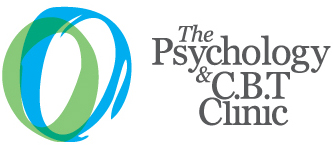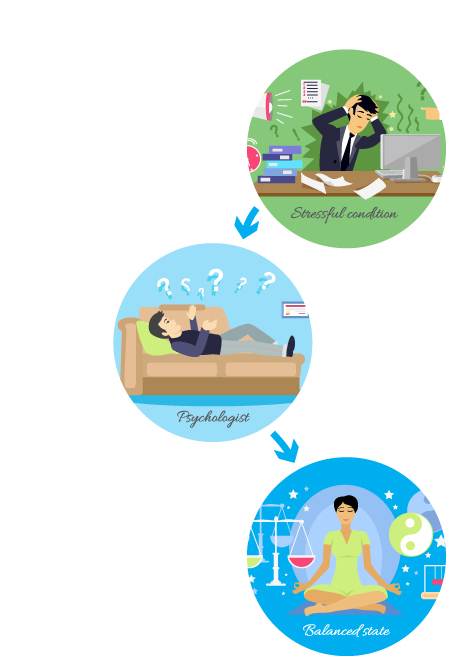 |
|
 |
Types of Psychological TherapyAt The Psychology Clinic we offer a range of psychological therapies including Cognitive Behavioural Therapy (CBT) a therapeutic approach with a strong evidence-base. There are hundreds of different types of psychological therapies or 'talking' therapies currently available with new ones emerging regularly. A very small number of these therapies have been proven to be effective through research studies but the majority have not. Below is a summary of the most notable therapies and the evidence that supports them. |
|||||
| Cognitive Behavioural Therapy - CBT | Behavioural therapists base their therapy on the theory that all behaviours learnt in response to past experiences can be unlearnt without focusing on the reason for the original behaviour. Cognitive Behavioural Therapy is a time limited therapy (average minimum 15-20 therapy sessions) that includes all the basic tenets of behavioural therapy while incorporating the role of thinking. What individuals believe about themselves, others and the world is essential to their psychological functioning and general sense of wellbeing. There is a wealth of research studies that support the effectiveness of Cognitive Behavioural Therapy. It is the only therapy with such a large and robust evidence base across a range of problems. Cognitive Behavioural Therapy is recommended as the therapy of choice for anxiety, depression, OCD, PTSD and eating disorders.
|
|||
| Acceptance and Commitment Therapy (ACT) | Acceptance and Commitment Therapy (ACT) is also considered a form of CBT, however, it has been developed more recently and is still developing an evidence-base. It combines aspects of traditional CBT with a range of other psychological techniques including: acceptance, mindfulness, commitment and behavioural change. Its principle goal is to increase psychological flexibility; instead of teaching strategies to facilitate the control of thoughts, feelings and behaviours it helps the individual to develop a different relationship with their experience whereby they notice and accept what occurs and then step back or distance themselves from it. This creates better awareness between the individual and their immediate experience which can be used to explore options that were not evident before. Research studies have found ACT to be effective in the treatment of a range of problems including: chronic pain, additions, smoking cessation, depression anxiety, psychosis, work place stress, diabetes management, weight management, self harm, body image difficulties, eating disorders and stress. |
|||
| Psychodynamic Therapy | Psychodynamic Therapy is based on the theories of Freud and tends to require a longer-term approach, sometimes involving frequent weekly sessions and therapeutic commitment for a number of months to years. Therapists focus on unconscious thought processes and the behaviours that these result in and how past experience influences present experiences. The theory has a strong focus on the past, particularly early childhood experiences. There is some evidence to support the effectiveness of Psychodynamic Therapy but is it limited compared to other types of therapy. |
|||
| Cognitive Analytic Therapy (CAT) | Cognitive Analytic Therapy is a short term therapy (usually 16-24 therapy sessions) which combines elements of cognitive therapy (e.g. Cognitive Behavioural Therapy) with psychoanalytic therapy. Therapists focus on trying to understand connections between childhood patterns, social factors and their impact on the individual. There is a growing but still far from adequate evidence base for Cognitive Analytic Therapy with a particular lack of randomised controlled trials (the most rigorous way of determining if a cause-effect relationship exists between therapy and outcome). |
|||
| Eye Movement Desensitisation Therapy (EMDR) | EMDR is a therapy that was developed initially for the treatment of trauma and combines exposure based therapy (a feature of Cognitive Behavioural Therapy) with a back and forwards movement of the eyes induced by the therapists moving finger. Numerous control studies show that EMDR is better than no therapy in the case of trauma but no research study has yet to show that it is better than exposure based therapies (such as Cognitive Behavioural Therapy). |
|||
| Family Therapy | Family therapy includes a number of therapeutic approaches where the therapist treats a family as a whole rather than singling out specific family members for individual therapy. The evidence supports the effectiveness of family therapy for sleep, feeding and attachment problems in infancy; child abuse and neglect; conduct problems (including childhood behavioural difficulties, ADHD, delinquency and drug abuse); emotional problems (including anxiety, depression, grief, bipolar disorder and thoughts of self-harm); eating disorders (including anorexia, bulimia and obesity); and somatic problems (including enuresis, encopresis and recurrent abdominal pain). |
|||
| Gestalt Therapy | Gestalt therapy is a Humanistic Therapy that is based loosely on the Gestalt concepts of unity and wholeness. Therapy, which is usually conducted in groups, focuses on attempts to broaden a person's self awareness and personal responsibility by using past experiences memories, emotional states, bodily sensations etc. There is a lack of scientific research supporting the effectiveness of gestalt therapy. |
|||
| Person Centred Therapy | Person Centred Therapy aims to provide a non judgmental environment involving good listening, unconditional regard and joint reflecting in which individuals can reconnect with their values and sense of self-worth and therefore move forward. In this therapy the therapist's main goal is to help the individual recognise their strengths by offering a genuine and understanding experience. There is some evidence to support the effectiveness of this therapeutic approach but it has not been shown to be more effective than other types of therapy including Cognitive Behavioural Therapy. |
|||
| Group Therapy | In group therapy groups of individuals meet together with a therapist. Individuals achieve benefit from peer support and gaining strength as they share their experiences with others who are facing the same obstacles as themselves. Some gain strength from observing the resourcefulness of other whilst others gain a sense of competence by assisting others. Individuals may also learn useful strategies from the facilitator and each other. Evidence suggests that group therapy is effective for substance abuse, personality disorders, eating disorders and grief. Group based therapy is also helpful in assisting with behaviour difficulties in children and adolescents in which case the parents meet to learn parenting strategies to help manage the disruptive behaviours. |
|||
| Mindfulness Based CBT | Mindfulness Based CBT is part of more recent CBT-based therapies and combines traditional CBT with the Eastern Buddhist principles of mindfulness and meditation. It focuses on enabling individuals to develop a different relationship with their experiences enabling them to accept thoughts and feelings as they occur and instead of reacting to them and being drawn further into the distress and discomfort that accompanies them, allowing them to pass without doing anymore than acknowledge their presence. This approach has been shown to interrupt the automatic processes that maintain problems like depression, anxiety, obsessive compulsive disorder and eating disorders and increase the likelihood of relapses following recovery. The National Institute for Clinical Excellence (NICE) has endorsed this approach in the prevention of relapse for depression following evidence that Mindfulness Based CBT can reduce the chance of relapse by 50% in individuals who have experienced three or more episodes of depression. |
|||
| Schema Focused Cognitive Behavioural Therapy (SFCBT) | Schema Focused Cognitive Behavioural Therapy is an extended version of Cognitive Behavioural Therapy (CBT). Traditional CBT focuses primarily on resolving current symptoms and their day to day triggers. In many cases this is sufficient to lead to a complete recovery from symptoms, however, in certain cases where the problem is either very severe or chronic to achieve similar results it is necessary to address the historical factors that underlie the problem. Schema Focused CBT has been developed to address such historical factors (including 'toxic' childhood experiences) and works using an adapted version of traditional CBT in order to stop past experiences intruding on and influencing current ones. Research has shown it to be effective in resolving a range of long standing problems including chronic depression, anxiety, eating disorders and low self esteem. Like traditional CBT, Schema Focused Cognitive Behavioural Therapy is time limited but due to the fact that it addresses experiences that have occurred over the lifespan, the average length of a programme is slightly longer (usually between 25-40 sessions). Schema Focused Cognitive Behavioural Therapy is usually offered after an initial (shorter) programme of traditional CBT which reduces current distress so the individual is able to focus on resolving underlying issues thus achieving improved functioning and wellbeing. |
|||
| Solution Focused Therapy | Solution Focused Therapy is a brief therapy that focuses on the goals that an individual wants to achieve rather than the problem(s) that they seek help for. This therapy focuses on the present and future rather than the past. The therapist uses a number of different techniques to help the individual to consider their goals for the future and work towards achieving them. The evidence suggests that Solution Focused Therapy is effective for mild problems of a short duration. |
Clinical Director
Specialism
Types of Therapy
Child Therapy
Adolescent Therapy
Adult Therapy
Parenting and Family Support
Psychological Assessment and Testing
Training
FAQ
Contact